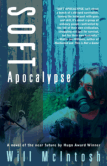
Will McIntosh’s “Soft Apocalypse” is one of the most emotionally intense and harrowing books I have read in several years. Set in the near future, it is the story of one man, and his friends, as they live through the terminal decline of our modern civilization.
“Soft Apocalypse” is refreshingly different then most “end of the world” genre books – you see, this book is about you. Yes, you. You are no action hero. You don’t know how to grow your own food, and you probably aren’t a crack shot. If you were in a zombie movie, your brains would be in the digestive tract of the walking dead. This book’s author’s protagonists are all ordinary people like you and I, not action heroes.
Throughout the entire book, the protagonist, Jasper, deals with life as society slowly crumbles. He doesn’t have any grand plan, he just muddles by, unheroically, with a circle or friends, as things gradually decay. The book takes place over a decade, and through the slings and arrows of Jasper’s daily life, you get a real sense of what it is like to live through the gradual decay of civilization. If most fictional ends of the world are the sharp bite of a cobra, this one is the slow, long suffocation of a constrictor.

Our story opens with Jaspar and friends living as travelling nomads a few years after a major depression has led to 40% unemployment. While things are bad, modern life is still holding up. The power’s on, you can still find Oreos at the grocery store, and a text message is still the fastest way to stay in touch with friends. Yet, the middle class has declined, the armies of the poor are vast, and the rich live in secure privately-guarded enclaves while ostensible public servants such as the police do nothing to prevent or try to stop crime. In many ways, it is America as a third world country.
As the years pass, Jasper settles into a modicum of stability as a convenience store manager, moving in and out of various social circles consisting of old and new friends, as the world around him continues to crumble. The economy just doesn’t improve. A nihilistic tribal-ish terrorist movement called the Jumpy Jumps spreads random dadaesque violence. Strange new diseases and genetically engineered destruction accelerate the decay of both the natural and man-made environment.
There are so many fascinating and well-written vignettes here – a bowling alley during a power outage, a trip to a virtual reality speed dating service, a flash rock concert, an abandoned carnival, canine-powered taxis, browsing an abandoned bookstore, and even (a bit too sterotypical) an emergency surgery via cell phonel.

This is a challengingly violent book – brutal rapes, torture, violence against people and animals – that are frankly disturbing and in many ways reminiscent of accounts I have read from World War II. In one scene, paramilitaries are executing citizens, and Jasper spots a fondly-remembered teacher about to be shot, and all he can do is look away while the man begs for help. Even a riot which destroys a Wal-Mart is rendered in a way that is less about economic despair and more about pure nihilism. Many of the scenes of destruction are more heart-rending then other books’ nuclear wars, perhaps because those are massive, while this book is, in many ways, very intimate. As ugly as the violence is, it is never gratuitous or celebrated, and is presented as a necessary part of the plot.
There is despair in “Soft Apocalypse” – the book in many ways seems the fictional representation of the famous poem by Yeats – the center definitely cannot hold, and a bevy of antagonists tear down society while decent people – including our protagonist, can’t do much other then survive the best they can as the rudiments of civilizations gradually seep away. The book’s strength is the author’s exposition of Jasper’s essential humanity, even after he sees everything he has cared about fall away and is forced, in the end, into making a terrible choice. Like Cormac McCarthy’s The Road , there is no happy ending, but like “The Road” the “Soft Apocalypse” is at its best when exploring the human condition, and how humanity can exist even in the most terrible conditions.
“Soft Apocalypse” is not a fun read, but is a very good book, and has provoked hours of thought and reflection, even after I was finished. It also kept me up at night, and it has been a while since any book was able to do that.














